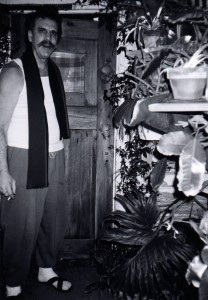Matthew Simmons
Matthew Simmons lives in Seattle.
Matthew Simmons lives in Seattle.
 Recently, Alice Hoffman had a bit of a blow-up over a bad review that gave away too many plot points. (Also, the review was not altogether positive.) So, she argues something like this:
Recently, Alice Hoffman had a bit of a blow-up over a bad review that gave away too many plot points. (Also, the review was not altogether positive.) So, she argues something like this:
“Critics, don’t spoil my plots. I control the release of information, and am careful about how things unfold.”
After I read Never Let Me Go by Kazuo Ishiguro, I read some of the critical reviews and author spotlights that came out with the book and they almost all gave away a significant piece of information about it—a piece of information that Ishiguro does not himself mention (though it is hinted at, of course) until page 80. At an author event, I asked Ishiguro about it, and his shrugged it off. He didn’t care. He argued something like this:
“The ‘mystery’ in the plot is not important, but instead the mystery of the characters is. The book is not about the idea that drives the plot, but the way the characters live in the world I have created for them.”
Is someone right here? I really don’t know. Is Hoffman suggesting that the pleasure of reading her book is primarily in following the plot? And that if we know what happens, we’ll be disinclined to read it? If Ishiguro doesn’t care about what the critics revealed about his book, why did he wait for 80 pages to reveal it himself? The revelation was, in my reading experience, a very powerful one. Is he wrong to be fine with a critic depriving a reader of that powerful experience?
Are these two unrelated situations that I am throwing together?

Gene and I were chatting about Shotgun Ninja last night and found out that we both had the same secret desire. We both want to meet an indie video game designer and collaborate with them to make games. But how would we ever make this happen?
Well, we have a blog. We have readers. We may as well go ahead and ask.
Are you an indie video game designer? Would you like to collaborate with willing members of the HTML Giant team? Would you like to be the HTML Giant Gamemaster? Get in touch. I’m at
giantblinditems
at
g
mail
dot
com
Imagine: EVER, The Escape
[ ]
[ ]
[ ] [ ]
Or pr’s Baked Tennis All Stars.
Or BE SAM PINK: the game.
A Jello Horse’s Giant Turtle Rampage.
The Log of the S.S. Marie Unguentine Movie Tie-in Game.
An HTML Giant text adventure.
Etcetera.
Spread the word. We’re serious.
httpv://www.youtube.com/watch?v=WokfJUK0nAk

(Photo of Steve Richmond by Mike Daily, 1993)
A couple of weeks ago, Portland writer Mike Daily sent me a copy of a bound essay entitled Gagaku Meat: The Steve Richmond Story. It’s a hell of a thing, actually.
Daily discovered Richmond through the work of Charles Bukowski. They were (Richmond and Bukowski) on-again, off-again friends and fellow practioners of what some call the Meat School of poetry—masculine, direct, sometimes down on its luck. And where Richmond seems to have been influenced by Bukowski, Daily seems influenced by Richmond. Legacy. READ MORE >
 Follow this link for a series of clerihews by my friend Brad.
Follow this link for a series of clerihews by my friend Brad.
A clerihew is a four-line biographical poem. They are characterized by a whimsical tone, and I thought maybe today we could use some whimsy. Included is this one about Dennis Cooper:
Party-pooper,
Dennis Cooper:
First violent erections…
Then, alas, vivisections.
(For the record, Brad is a big fan of Cooper’s work. Whimsy.)
More (including Foucault) after the jump READ MORE >

“Say I’m writing an essay about my buddy Nate. If I remain completely faithful to the source text, I’d interview Nate and transcribe his quotes exactly, even keeping his incomplete sentences and particular use of “dude,” “man,” “you know what I’m sayin’,” fillers. Documentary playwrights have used this technique to capture a character through the preservation of unique speech patterns. Nate would be left as he is, the reader would have an awkward experience, and the target text would be thus foreignized. If I want to completely domesticate Nate, I wouldn’t interview him; I’d compose all his statements so the reader would have a totally fluid, coherent, rhythmic, economical, etc. speaker on the page. That wouldn’t at all be the Nate that exists in the real world (because no one actually speaks like this) but the reader would glide down the page with no trouble. Memoir is likely to take this approach. If I want to do something in between, I can do what a journalist does: interview Nate to capture his words and the way he uses them, but complete his sentences and give him the veneer of eloquence.
“Or—and this is what more realistically happens both in the art of translation and the art of nonfiction—the decision to domesticate or foreignize the source text comes line-by-line, word-by-word.”
—Brian Goedde
From a short, sharp essay on, as the title says, creative nonfiction as a form of translation.
(I worked with Goedde a number of years ago and just happened to think about him. At the time, he published a short book/long essay about hip-hop that I liked quite a bit. Apparently, he really pissed off Michelle Malkin and some jackass Freepers in late 2007 with this NYT essay. Good for you, Brian.)